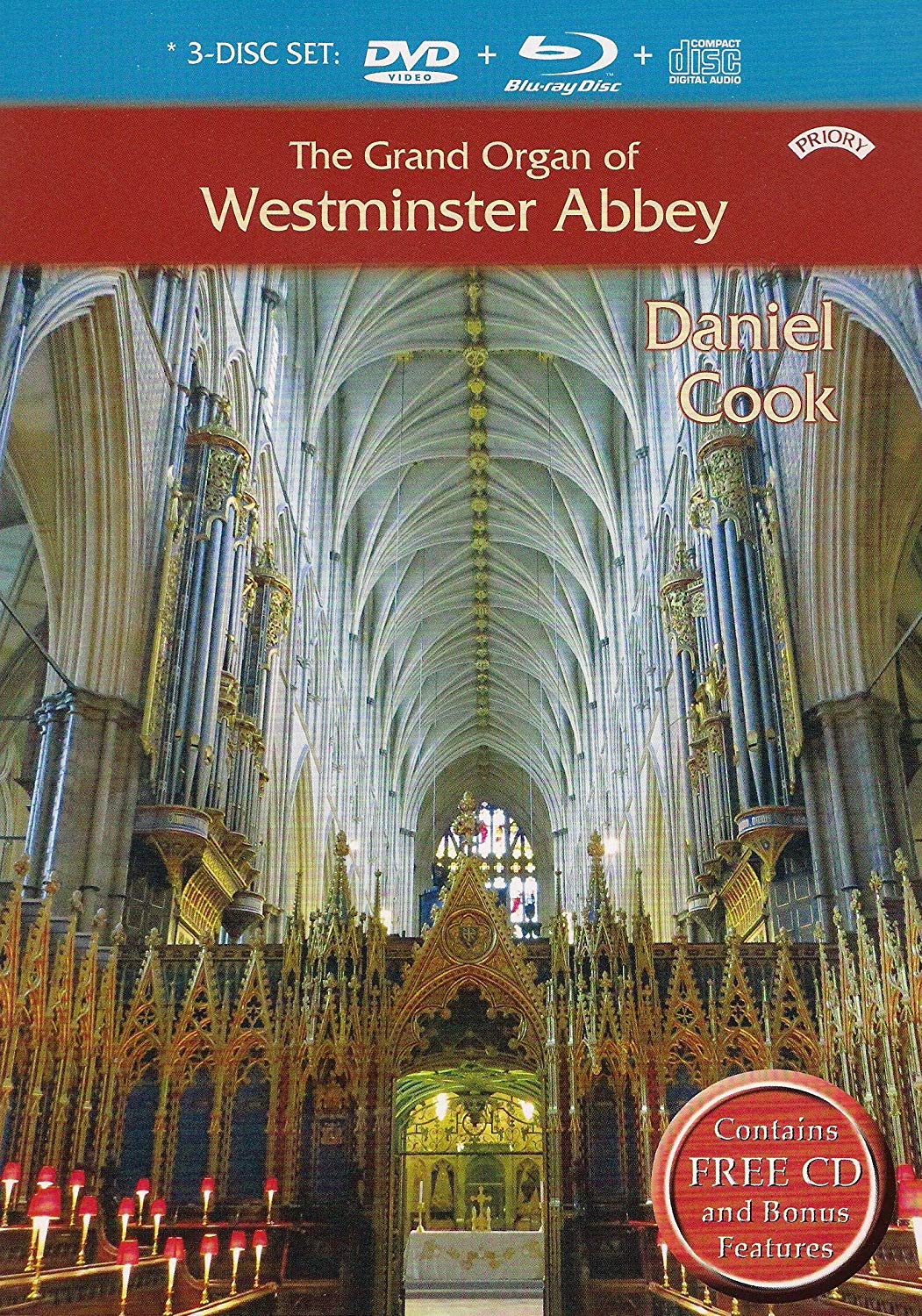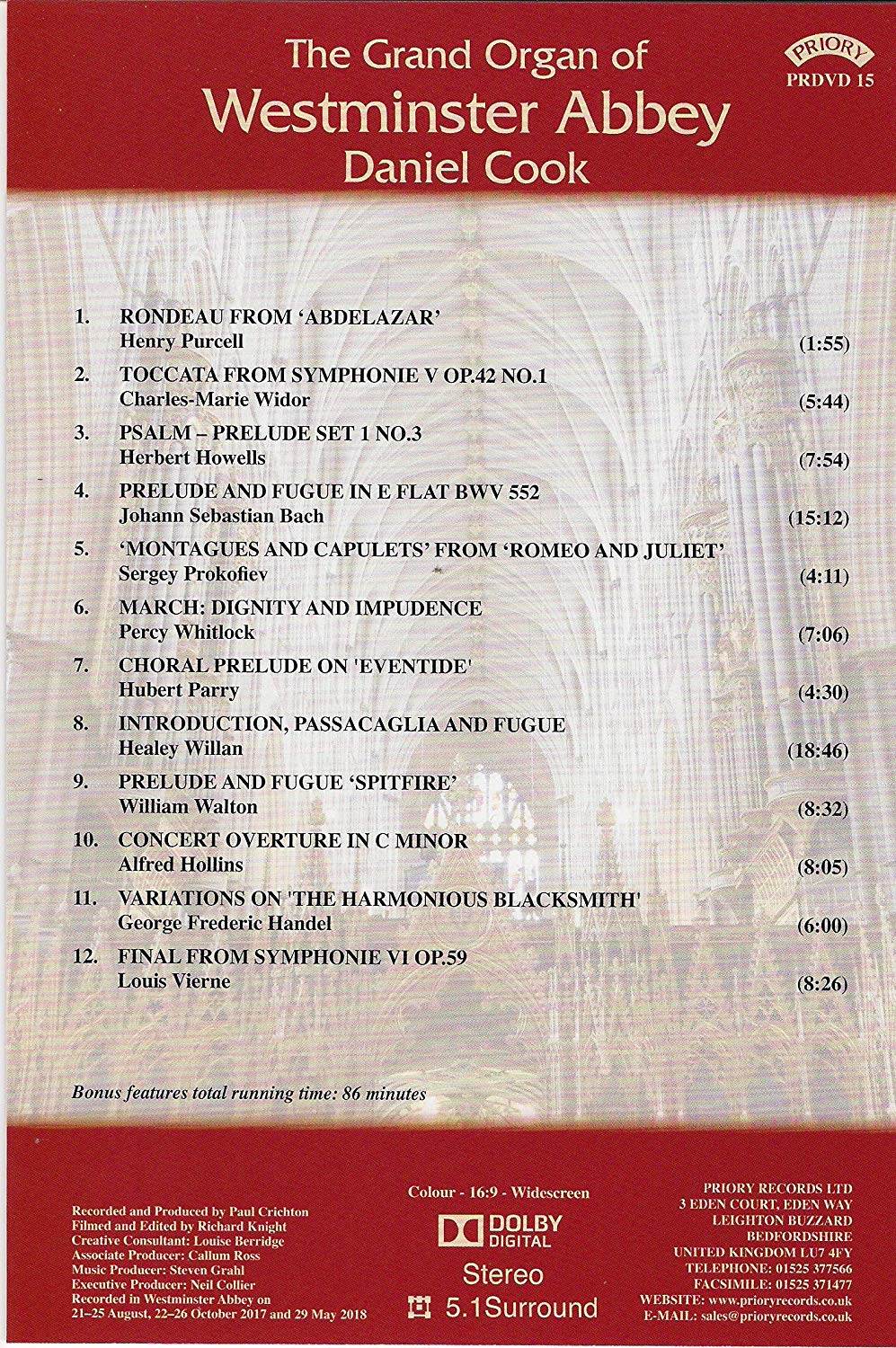

The Grand Organ of Westminster Abbey concert. Daniel Cook plays the following selections on the grand organ of Westminster Abbey:
Purcell “Rondeau” from Abdelazar
Charles-Marie Widor “Toccata” from Organ Symphony No. 5
Herbert Howells Psalm-Prelude Set 1 No. 3
J. S. Bach Prelude & Fugue in E Flat
Prokofiev “Montagues And Capulets” from Romeo and Juliet
Percy Whitlock “Dignity and Impudence” (March)
Parry “Choral Prelude” on Eventide
Walton Spitfire Prelude & Fugue
Alfred Hollins Concert Overture in C Minor
Handel Variations on The Harmonious Blacksmith
Louis Vierne Final Movement from Organ Symphony No. 6
Priory specializes in church and organ music. This package has a Blu-ray, a DVD, and a CD! Recorded and produced by Paul Crichton; filmed and edited by Richard Knight; Creative Consultant was Louise Berridge; Associate Producer was Callum Ross; Music Producer was Steven Grahl; Executive Producer was Neil Collier. Released 2018, the Blu-ray disc has 5.1 Dolby Digital sound. Grade: A
This is the 6th title in Priory’s magnificent “Grand Organ” series of recitals in British cathedrals published in Blu-ray. To learn more about these recordings, which are loaded with extraordinary special features, go to the left navigation bar and click on “Titles by Publisher. ” Then select “Priory.” We gave an A to all 6 of the titles in this series issued in Blu-ray. (Priory has issued other recitals at famous churches in DVD as well, but we have not covered them.)
This title opens with Daniel Cook playing the recital above. Of course, we get many views of Cook at work. But we also get many images of the Cathedral during the music, and a few of these images are shown below in our screenshots. First below is the front of Westminster Abbey. We have been to London and tried to visit the Cathedral at least three time. But the lines were always too long! Maybe watching this video from Priory is the best way to see the Abbey:
The next four screenshots focus on the architecture of the church. The Abbey is a monument to 1000 years of English history. It’s one of the world’s leading tourist attractions. Finally, it is a working church with an extensive music program based on 3 organs: In the next shot below you see Daniel Cook at the main organ:
The earliest artifacts in the church truly speak of the “dark ages”:
A huge number of the English nobility are buried or otherwise remembered at the Abbey. Next below is the famous portrait of King Richard II:
Henry VIII was the most famous (and infamous) King of England. He was not buried in the church, but he is memorialized in stained glass:
England’s most famous Queen was Elizabeth I, also called the “Virgin Queen.” She was about age 2 when Henry VIII murdered her mother. But Elizabeth went on to live long and become much beloved by the people. She was probably the best educated woman in England in her day, and she survived innumerable threats to life and limb through astute political moves and diplomatic skill (especially by keeping everyone in confusion about whom she might marry, but never did). The time of her rule is now called the Elizabethan Age, and she (unlike her father) was honored with a magnificent tomb in Westminster Abbey:
The building is full of glorious art in various forms great and small:
In addition to royalty, many famous people from the United Kingdom are buried at the church. Next below is England’s Tomb of the Unknown Soldier:
Handel adopted England and was buried at the Abbey:
Hawking is maybe the most famous person of our time to be buried at Westminster:
What an honor to be buried at the same place with perhaps the most famous scientist of all time, Isaac Newton:
Many other famous people are not buried at Westminster, but are otherwise memorialized:
Winston Churchill:
William Shakespeare and other famous writers are remembered in the poets’ corner:
One of the most remarkable memorials at the church is comprised of the statutes of the Martyrs of the Twentieth Century including Martin Luther King Jr. (6th from the left with the child at his feet) and Dietrich Bonhoeffer (4th from the right holding a book):
All the images above and many others are shown while Daniel Cook plays his recital, which is considerably heavier than the programs played in most of the organ videos in Priory Grand Organ series. I especially liked the Prokofiev music from the ballet Romeo and Juliet and the Handel Variations on ‘The Harmonious Blacksmith’.
In addition to the music performed as listed above, Daniel Cook guides you through the following bonus features:
Detailed discussion of the main program — 14 min.
Main Organ tour with emphasis on the huge number of stops available and a few shots of pipes — about 30 min.
Demonstration of the Lady Chapel Organ — 5 min.
Demonstration of the Song School Organ — 5 min.
Narration of playing of the Herbert Howells Psalm-Prelude with 4 simultaneous views of the action — 8 min.
Finally, here are a few screenshots from the bonus features.
The Main Organ has a lot of stops, and Cook patiently explains many of them:
Next below some pipes hidden out-of-sight:
Cool idea: in the shot below only the pipes being specifically discussed by Cook are shown in sharp focus!
Cook also demonstrates the Lady Chapel Organ shown below and the Song School Organ:
And most amazing bonus of all is a complete performance of the 8 min. Herbert Howells number with 4 views simultaneously displayed!
After reviewing this video, we are more interested than ever in seeing Westminster Abbey. If we get back to London, we will have to get up early and be first in line! As with all our other reviews in this Grand Organ series in Blu-ray, this title get an A.
Here’s an official clip:
OR
































